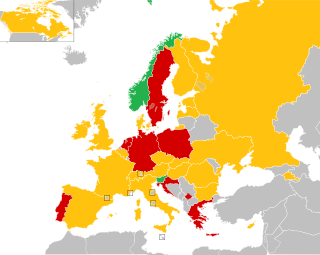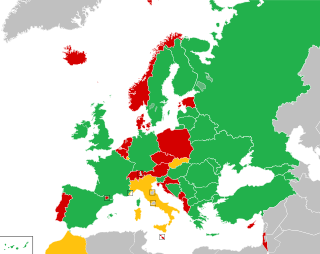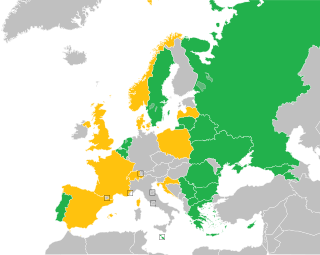
The participation of the Croatia in the Junior Eurovision Song Contest first began at the inaugural Junior Eurovision Song Contest in 2003 which took place in Copenhagen, Denmark. Hrvatska radiotelevizija (HRT), a member organisation of the European Broadcasting Union (EBU), were responsible for the selection process of their participation. Croatia originally used a national selection format for their participation at the contests. The first representative to participate for the nation at the 2003 contest was Dino Jelusić with the song "Ti si moja prva ljubav", which finished in first place out of sixteen participating entries, achieving a score of one hundred and thirty-four points. Croatia first withdrew from competing in the Junior Eurovision Song Contest in 2007. After seven years of absence, Croatia decided to return to the contest in 2014 which was held in Marsa, Malta and selected their entry internally. However after placing last with Josie and the song "Game Over", Croatian broadcaster HRT again withdrew from competing the following year, and have yet to make their return to the contest.
Cute is a teenage girl band from Malta consisting of Salaia Gerada, Trisha Smith, Paulanne Farrugia, Celaine Borg, and Marzia Farrugia. The group participated for Malta in the Junior Eurovision Song Contest 2007, in Rotterdam, Netherlands with their song "Music". They performed fourteenth in the contest, preceding Greece, and succeeding Sweden. They finished in 12th place scoring 37 points overall.
Eurovision, founded 1954 in Geneva, Switzerland, is a television network that is part of the European Broadcasting Union.

The Netherlands has sent an entry to every Junior Eurovision Song Contest since its creation in 2003. The Netherlands is one of only two countries to have taken part in every Junior Eurovision Song Contest, the other one being Belarus.

Belgium has competed in every Junior Eurovision Song Contest until 2013. The country's best result was in 2009, when Laura Omloop came 4th with "Zo verliefd". Belgium's worst result was in 2007, with Trust coming 15th with "Anders".

Denmark had competed in the Junior Eurovision Song Contest three times. The Danish broadcaster DR hosted the first Junior Eurovision Song Contest in 2003, having developed the contest's predecessor MGP Nordic.

The participation of Spain in the Junior Eurovision Song Contest first began at the inaugural Junior Eurovision Song Contest in 2003 which took place in Copenhagen, Denmark. Televisión Española (TVE), a division of Radiotelevisión Española (RTVE) and member of the European Broadcasting Union (EBU), were responsible for the selection process of their participation. Spain used a national selection format, broadcasting a show entitled Eurojunior, for their participation at the contests. The first representative to participate for the nation at the 2003 contest was Sergio with the song "Desde el cielo", which finished in second place out of sixteen participating entries, achieving a score of 125 points. Spain withdrew from competing in the Junior Eurovision Song Contest in 2007, and have yet to make their return to the contest despite many attempts in recent years.

Norway has participated in the Junior Eurovision Song Contest three times, and was the host of the 2004 Contest, where it was held in the Norwegian city of Lillehammer.

Cyprus has entered the Junior Eurovision Song Contest ten times since debuting at the first contest in 2003 with Theodora Rafti and the song 'Mia efhi'. They were forced to withdraw in 2005, as Rena Kiriakidi's 'Tsirko' was said to be too similar to another song. However, the Cypriot viewers were able to watch the show and vote.

The participation of Belarus in the Junior Eurovision Song Contest first began at the inaugural Junior Eurovision Song Contest in 2003 which took place in Copenhagen, Denmark. The Belarusian Television and Radio Company (BTRC) a member organisation of the European Broadcasting Union (EBU) have been responsible for the selection process of their participants since their debut. The first representative to participate for the nation at the 2003 contest was Volha Satsiuk with the song "Tantsuy", which finished in fourth place out of sixteen participating entries, achieving a score of one hundred and three points. Belarus have never missed an edition of the contest, and have won twice in 2005 and 2007. They hosted the contest at the Minsk-Arena in 2010 and again in 2018.

Poland has entered the Junior Eurovision Song Contest five times, competing in the first contest in 2003. The Polish broadcaster Telewizja Polska (TVP) decided to withdraw from the contest after coming last in both 2003 and in 2004, despite TVP signing a 3-year contract with the European Broadcasting Union (EBU). In 2016, it was announced that Poland would return after an 11-year break. Poland won the Junior Eurovision Song Contest for the first time in 2018 with Roksana Węgiel and her song "Anyone I Want to Be".

The participation of Portugal in the Junior Eurovision Song Contest first began at the Junior Eurovision Song Contest in 2006 which took place in Bucharest, Romania. Rádio e Televisão de Portugal (RTP), a member of the European Broadcasting Union (EBU), were responsible for the selection process of their participation. Portugal used a national selection format, broadcasting a show entitled "Festival da Canção Junior", for their participation at the contests. This was a junior version of Festival da Canção, the national music competition organised by broadcaster RTP to choose the Portuguese entry for the Eurovision Song Contest. The first representative to participate for the nation at the 2006 contest was Pedro Madeira with the song "Deixa-me sentir", which finished in second-last place out of fifteen participating entries, achieving a score of twenty-two points. Portugal withdrew from competing in 2008, and returned in 2017. Their worst result till date has been achieved by Rita Laranjeira with her song "Gosto de Tudo " in the Junior Eurovsion Song Contest 2018 where she placed 18th.

Ukraine took part in the Junior Eurovision Song Contest for the first time in 2006. Their best result came in Junior Eurovision Song Contest 2012 when Anastasiya Petryk won for Ukraine with "Nebo". Her sister Viktoria Petryk came 2nd at the Junior Eurovision Song Contest 2008 with "Matrosy".

The participation of Armenia in the Junior Eurovision Song Contest first began at the Junior Eurovision Song Contest in 2007 which took place in Rotterdam, Netherlands. Armenian Public Television (ARMTV), a member organisation of the European Broadcasting Union (EBU), have been responsible for the selection process of their participants since their debut. The first representative to participate for the nation at the 2007 contest was Arevik with the song "Erazanq", which finished in second place out of seventeen participating entries, achieving a score of one hundred and thirty-six points. Since their debut, Armenia have never missed an edition of the contest and won in 2010 with the song "Mama" by Vladimir Arzumanyan. They hosted the contest at the Karen Demirchyan Complex in 2011. Their worst result to date was achieved by Levon Galstyan at the Junior Eurovision Song Contest 2018 with his song "L.E.V.O.N" where he placed ninth. As of Junior Eurovision 2016, Armenia have awarded and received the most points from Georgia.

Lithuania has sent four entries to the Junior Eurovision Song Contest, first entering at the 2007 Contest in Rotterdam.

Portugal took part in the first Eurovision Dance Contest in 2007. Representing the country were Sónia Araújo, a TV host and Ricardo Silva, a ballroom dancer. The couple were chosen after winning the second Portuguese version of Strictly Come Dancing. The dances they performed at the contest were Jive and Tango. Portugal came joint fifth after receiving 74 points from 12 countries. It was their first top five finish in any Eurovision contest.

The Eurovision Young Dancers 2011 was the twelfth edition of the Eurovision Young Dancers, held at the Dance House in Oslo, Norway on 24 June 2011. Organised by the European Broadcasting Union (EBU) and host broadcaster the Norwegian Broadcasting Corporation (NRK), dancers from ten countries participated in the televised final. Croatia and Kosovo made their début while Germany and Portugal returned. Seven countries withdrew from the contest. This was the first edition to be successfully held since 2005, following cancellations in 2009 and 2007.
Luara Gurgenovna Hayrapetyan is an Armenian-Russian singer. She represented Armenia at the Junior Eurovision Song Contest 2009 in Kiev, Ukraine with her self-composed pop song "Barcelona", finishing in joint second place.

Italy debuted at the Junior Eurovision Song Contest when the twelfth edition of competition was held in Malta in 2014. The Italian broadcaster, RAI, selected the debut entry of country via an internal selection as "Tu primo grande amore" by the singer Vincenzo Cantiello. Italy finished the 2014 edition with a total of 159 points and ranked first. That made Italy the second country that won with the debut entry after Croatia's victory in the first edition.

















